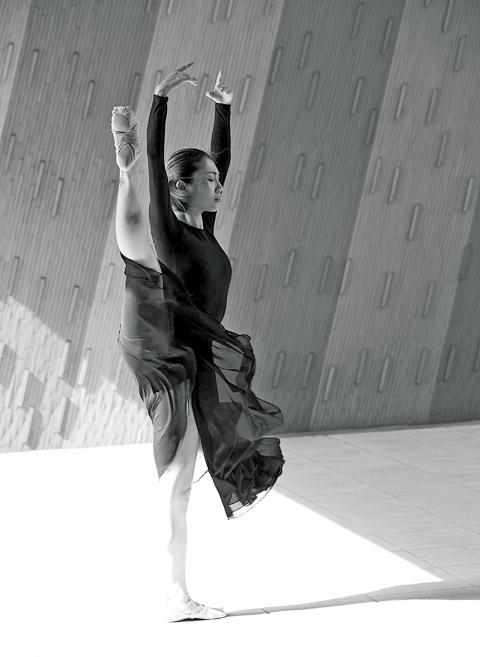The Taiwan Ballet Company (台灣芭蕾舞團), founded by Chuang Yuan-ting (莊媛婷), is just two-and-a-half years old, but it has big ambitions.
I missed its first program this year, a mixed bill presented at the Rose Historic Site (玫瑰古蹟) in downtown Taipei in mid-February, but the troupe earned praise from visiting British ballet choreographer/teacher/critic David Mead.
However, those who did not see that show now have a second chance this weekend, as the company is giving three shows of Flying (飛翔) at the Taiwan Traditional Theatre Center’s Experimental Theater.

Photo courtesy of Oraku Hiko
Like the February show, the works on the Flying program are a mix of Chuang’s own creations and classical ballet staples, plus a work by Chao Lee-wei (趙力緯) entitled Pinghsi (屏息).
She has created a program that mixes classical and modern influences, with music by European and Taiwanese composers.
The company will perform a version of the Grand Pas Classique, originally choreographed in 1949 by Victor Gsovsky to music from Daniel Auber’s Le Dieu et La Bayadere.
For Heaven (天), Chuang choose a piece of beiguan (北管) music, while for Heidong (黑洞), which is set on four dancers, she chose a movement from Finnish composer Esa-Pekka Salonen’s 2009 Violin Concerto.
Chaung’s Flying (飛躍) is set on four dancers to the third movement of Felix Mendelssohn’s Violin Concerto in E minor, Op. 64, while She is so beautiful (她~是如此美麗), is set to the third movement of Kaohsiung-born composer Tyzen Hsiao’s (蕭泰然) 1988 work, Violin Concerto in D major.
■ Tomorrow at 2:30pm and 7:30pm, Sunday at 2:30pm
■ Taiwan Traditional Theatre Center’s Experimental Theater (臺灣戲曲中心小表演廳 ), 751 Wenlin Rd (台北士林區文林路751號)
■ Remaining tickets are NT$600 and 800; available at the NTCH and Eslite ticket booths, online at www.artsticket.com and at convenience store ticket kiosks

Behind a car repair business on a nondescript Thai street are the cherished pets of a rising TikTok animal influencer: two lions and a 200-kilogram lion-tiger hybrid called “Big George.” Lion ownership is legal in Thailand, and Tharnuwarht Plengkemratch is an enthusiastic advocate, posting updates on his feline companions to nearly three million followers. “They’re playful and affectionate, just like dogs or cats,” he said from inside their cage complex at his home in the northern city of Chiang Mai. Thailand’s captive lion population has exploded in recent years, with nearly 500 registered in zoos, breeding farms, petting cafes and homes. Experts warn the

The unexpected collapse of the recall campaigns is being viewed through many lenses, most of them skewed and self-absorbed. The international media unsurprisingly focuses on what they perceive as the message that Taiwanese voters were sending in the failure of the mass recall, especially to China, the US and to friendly Western nations. This made some sense prior to early last month. One of the main arguments used by recall campaigners for recalling Chinese Nationalist Party (KMT) lawmakers was that they were too pro-China, and by extension not to be trusted with defending the nation. Also by extension, that argument could be

Aug. 4 to Aug. 10 When Coca-Cola finally pushed its way into Taiwan’s market in 1968, it allegedly vowed to wipe out its major domestic rival Hey Song within five years. But Hey Song, which began as a manual operation in a family cow shed in 1925, had proven its resilience, surviving numerous setbacks — including the loss of autonomy and nearly all its assets due to the Japanese colonial government’s wartime economic policy. By the 1960s, Hey Song had risen to the top of Taiwan’s beverage industry. This success was driven not only by president Chang Wen-chi’s

Last week, on the heels of the recall election that turned out so badly for Taiwan, came the news that US President Donald Trump had blocked the transit of President William Lai (賴清德) through the US on his way to Latin America. A few days later the international media reported that in June a scheduled visit by Minister of National Defense Wellington Koo (顧立雄) for high level meetings was canceled by the US after China’s President Xi Jinping (習近平) asked Trump to curb US engagement with Taiwan during a June phone call. The cancellation of Lai’s transit was a gaudy